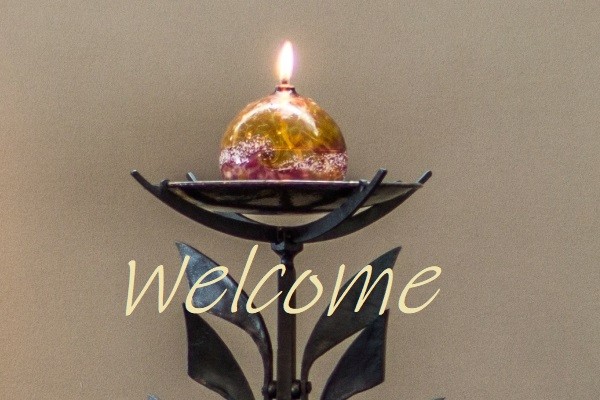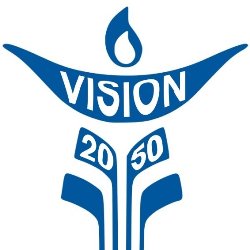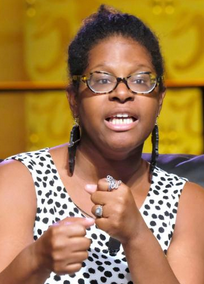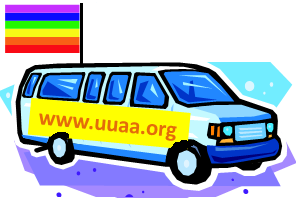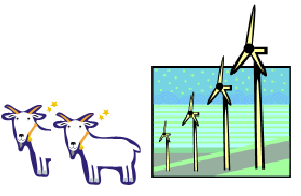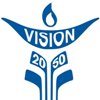WELCOME!
... To a faith with the power to transform lives and change the world. ... To a faith that can sustain and enrich the next chapter of your life.
Highlighted Events
UUAA Congregational Vision
UUAA's Congregational Vision
UUAA’s Vision 20/50 project began with a year-long community dialogue in 2019-20 about who we want to be as a congregation, and what kind of world we want to leave future generations. The result was a boldly-imagined bright and just future for our children and grandchildren that we intend to bring alive by living in alignment with our principles, values, and covenants.
The Vision 20/50 Congregational Vision document lifts up three Vision priority areas that will serve as our congregation’s guiding North Star for the work we will do together in coming years:
Climate Justice and Environmental Action
Radical Welcome
Anti-Racism & Anti-Oppression
These priority areas of our work are directly linked to our congregation’s long history of advocating for environmentalism, civil and human rights, and standing up for the pressing issues of the day: immigration and prison reform, LGBTQI rights, anti-racism, hunger, poverty, homelessness, reproductive rights, and affordable housing.
In 1865, our founding members covenanted with each other “for the purpose of maintaining religious worship and conducting the temporal interests of a religious society.” Ever since this founding, we have worked within our congregation and with community partners to live out the audacious notion that we can make a difference in the world.
Our Vision 20/50 Story (a 7 minute, kid-friendly video)
Join in UUAA's Vision Work...
Climate Action | Climate Justice
Net Zero Carbon, Zero Waste, Resilience, Climate Justice...
The climate crisis is an existential threat to the web of life — life that people of faith and conscience are called to protect. UUAA discussions during our 2020 visioning process made it clear that the congregation wants our community to take bold actions that address sustainability, resilience, and climate justice issues. As a faith community, we would hope to serve as an example by living in harmonious relationship with the natural world, and by working in collaboration with community groups who are confronting injustices caused by climate change.
In March, 2021, UUAA enrolled in the Unitarian Universalist Association’s Green Sanctuary 2030 Program. This program provides us with a structure and additional resources to accelerate our action planning on climate issues. Our work includes:
Taking action to make our UUAA building and land carbon-neutral, and to move toward Zero Waste.
Inspiring each other to take action on sustainability issues surrounding food production, energy use, soil and water, and more.
Learning together and to providing spiritual resources to help adults and children in our community learn resilience and find their own ways to act on climate issues…with hope and shared conviction.
Working in collaboration with outside groups who make an impact on climate justice issues that affect vulnerable members of our Southeast Michigan community.
Adding our voice to local, state, and national dialog on climate related policies.
UUAA groups supporting this effort include the Green Sanctuary Leadership Team, the Climate Crisis Action Team, the Mindful Eating Team, UUAA youth working with the Sunrise Movement and others. Please read more about this critical work on the Climate Crisis Action page.
For more information, email This email address is being protected from spambots. You need JavaScript enabled to view it.
Radical Welcome
As a radically welcoming congregation, we actively invite the voices, presence, and power of many people and groups in order to help shape the congregation’s common life and mission. We seek especially to include the people and groups systematically pushed to the margins, cast out, silenced, and closeted.
As congregants, Radical Welcome asks each of us to:
bring our culture, our voice, our whole self to engage in truly mutual relationships
be present, to listen, to be curious, to be compassionate and open-hearted
be willing to be changed by those who come to our Congregation
celebrate our common humanity
As elected leaders, lay leaders, and staff, Radical Welcome asks us to:
seek to ensure that the presence, gifts, and perspectives of all people will be visible and valued
engage with congregants and groups in the UUAA community when they feel their voices aren’t being heard about systemic issues
develop new systems and modify existing systems, programs, and communications that invite and welcome all people - including those from groups who have been historically marginalized.
As a Radically Welcoming congregation, we aspire to become known and recognized as a transformed and transforming congregation with open doors and open hearts, where different people and groups share power, and shape identity, mission, leadership, worship, and ministries.
For a better understanding, we encourage you to look at this comparison Inclusion vs Radical Welcome from the Rev. Canon Stephanie Spellers, author and speaker on Radical Welcome.
For more information, email Hannah Hotchkiss at This email address is being protected from spambots. You need JavaScript enabled to view it.
Anti-Racism and Anti-Oppression
The existence of racist, anti-Semitic, Islamophobic, and anti-immigrant incidents - in addition to crimes against transgender people and other forms of oppression - causes great harm in our country and local communities.
We recognize the importance of examining these issues both within and beyond our congregation. This vision area seeks to define, refine, and implement a structure that can support a range of congregational actions on local, regional, and national levels. Some key questions we are considering include:
How can we, as members of the UUAA community, deepen our support and relationship with congregants and community members with marginalized identities - especially with BIPOC (Black, Indigenous, and People of Color) and queer and trans people?
How do we create a space where no one feels "other" and all serve as teachers and learners?
What relationships can we build with community partners who are working to end racism and oppression?
For more information, email This email address is being protected from spambots. You need JavaScript enabled to view it.
Thank you for taking time to learn more about our efforts to move Vision 20/50 forward. Your questions are welcome at This email address is being protected from spambots. You need JavaScript enabled to view it.
Vision Resources
To learn more about our vision process and our long history of activism and social justice work.
Vision 20/50 History & Timeline
Vision 20/50 Partner Outreach & Feedback Summary
Our Core Values - How should we bring these alive in our work?
Our History - What are we proud of that we would like to do more of in the future?
Mayor's Proclamation and Partner Organization Appreciations on our 150th Anniversary in 2015
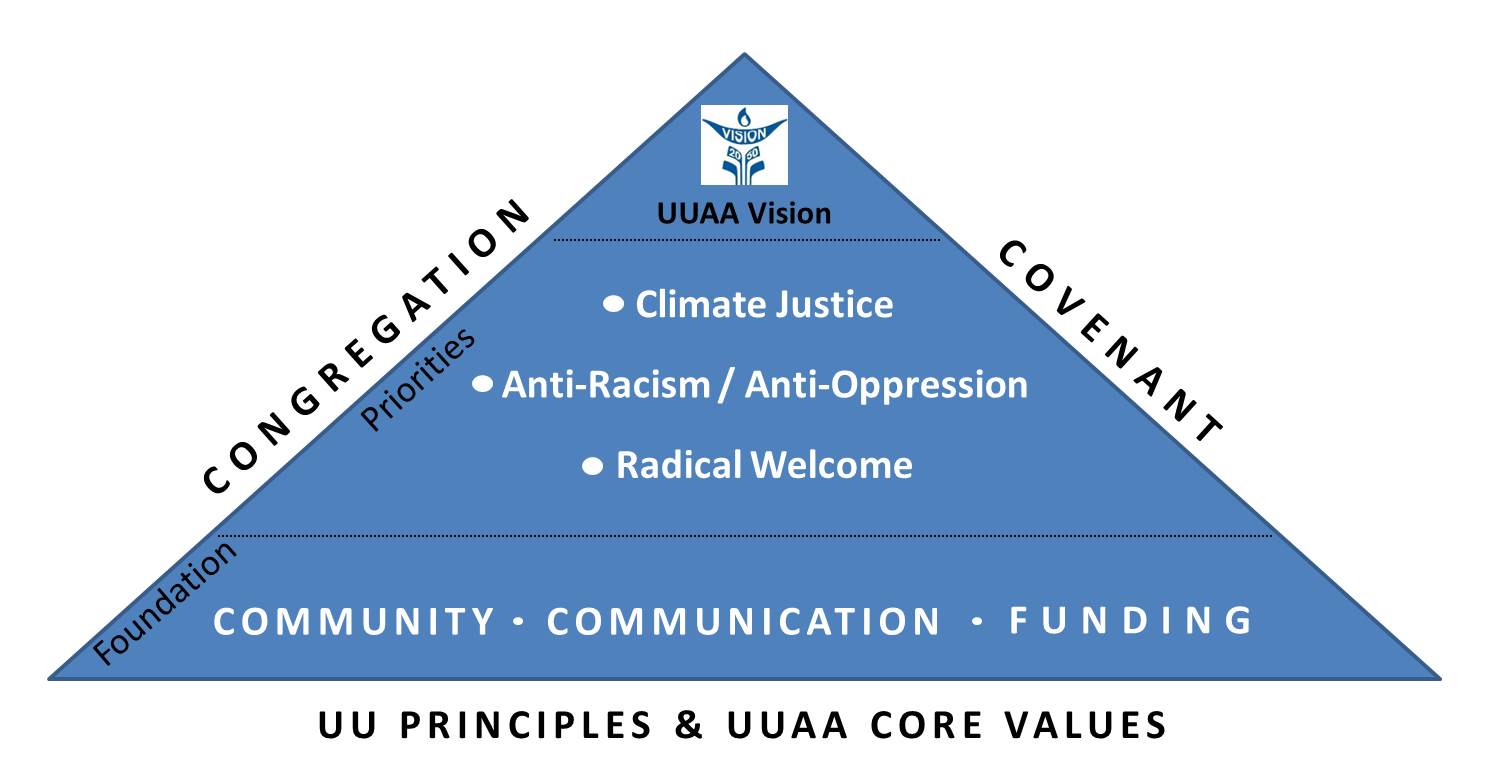
Vision 20/50 Theory of Change
Go Back to the Vision 20/50 Background Page
Go to the Vision Action Planning Page
The Theory of Change, shown below, shows the priority areas within UUAA Community Engagement and UUAA Inside the Congregation. The items outlined in purple had the most congregational interest and urgency and will receive our first focus as we work toward strategic planning.
The Theory of Change was created using all of the congregation (adult and youth) and staff input from visioning sessions. It spotlights what we, collectively, are proud of and value, what we see as assets to leverage, and how we see the UUAA’s role over the next generation.
To interpret the Theory of Change, begin at the bottom:
The first row (bottom) shows the key, bedrock values that we share; The next row up shows the aspects of UUAA that make us a bit unique, even among UU congregations. The next two rows spotlight our strengths and how we are poised to make changes, and then a set of changes needed to overcome some of our challenges.
The rows labelled "UUAA Inside the Congregation" (11 items) and the row "UUAA Community Engagement" (8 items) have now been prioritized. All of the items are on our "to-do" list, but those outlined in purple will receive first focus. This does NOT mean that other areas will receive no attention. In fact, many will get addressed next Fall, as we craft action plans for the higher prioritized areas—for example, working on Environmental and Climate Justice will certainly involve outreach to, and leadership development of younger and more diverse people.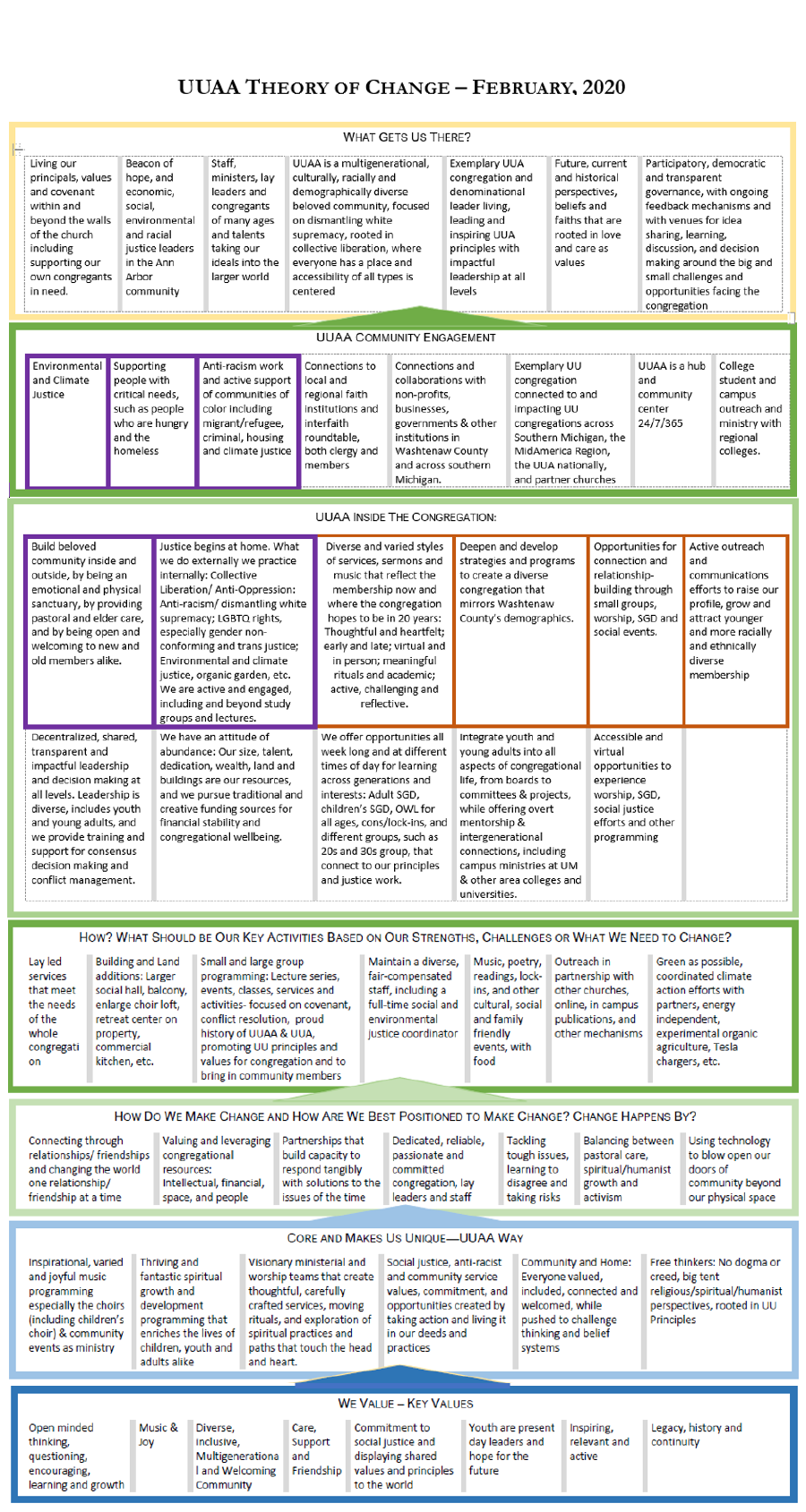
What Does Vision Analysis Look Like?
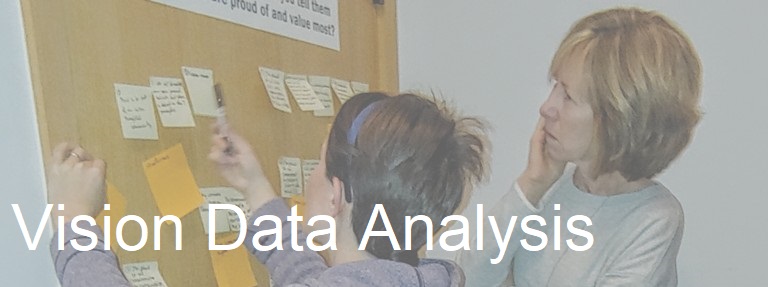
How were all of those sticky notes analyzed to create a vision for the future of UUAA?
All sticky notes were entered into a database.
Want to see what all of that data looks like? You can view a spreadsheet or PDF file of the sticky notes that were in the database:
Click this link to see the spreadsheet.
Click this link for the PDF-- and please note that you may want to magnify the PDF (150-200% might be good) to read the entries.
An abbreviated description of the data analysis is described here.
The Vision 20/50 leadership team, the Board, an Analysis Team and our consultant, Elandria Williams were all involved in analysis. The raw data was re-viewed thru several different lenses.
We split up our analysis teams so that each of us answered a question based on the submitted data-- noting the number of times something was mentioned and also noting some of the unique or strongly felt phrasing.
- One group looked at all of the sticky notes that had information about what we appreciate about UUAA and determined our foundation – Our basic values, and the characteristics of UUAA that make us uniquely who we are today. This is a foundational step toward our vision.
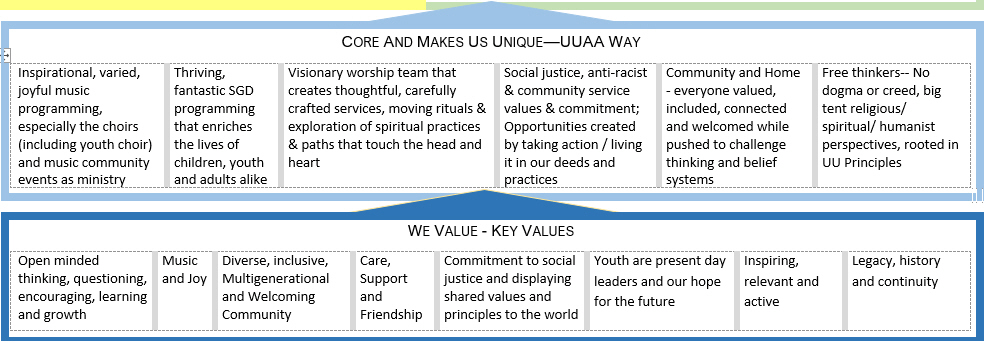
-- Another group looked for statements that noted strengths we could use to make changes at UUAA and how those strengths could help determine what our key activities should be:
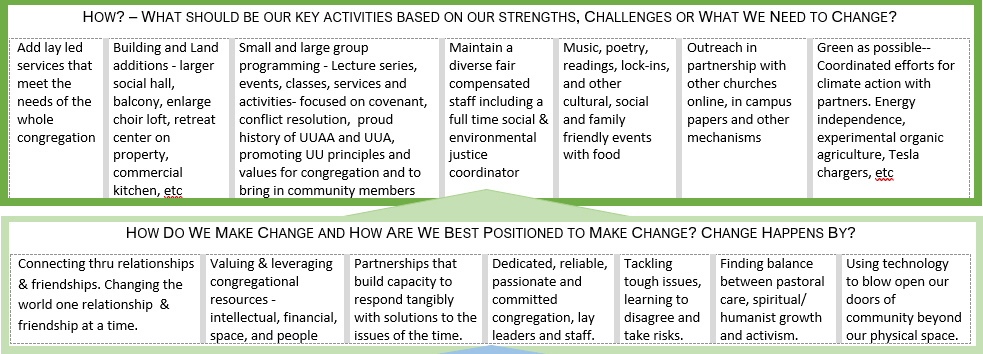
-- A group looked through responses to several vision questions to find the ways people thought we could expand or modify our current ministries to have greater impact within our congregation. How might we go bigger, deeper?
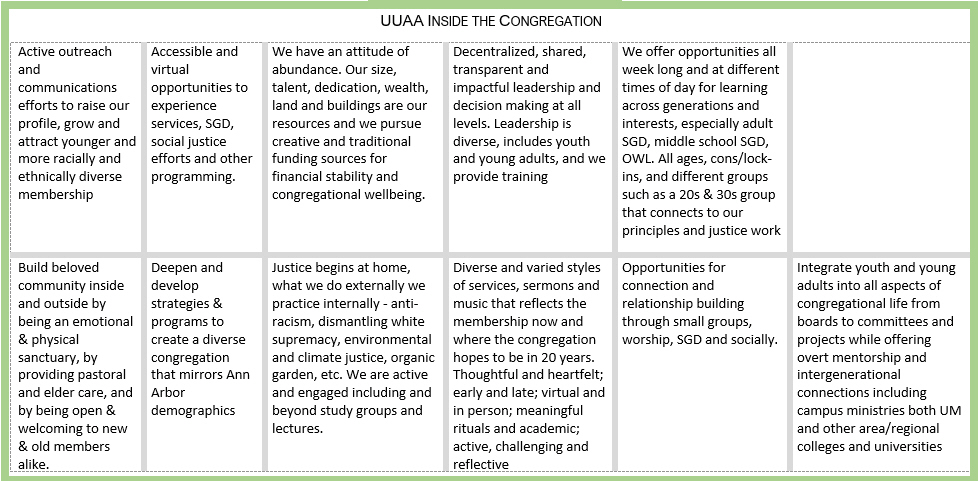
-- And a group looked through responses that spoke to ways our ministries could have greater impact outside our walls, in the greater community. How might we increase our impact?

And from all of the sticky notes that spoke to what we would like to become, we distilled statements indicating what our future should look like:

View the full January 26th Theory of Change.
What Comes Next?
At our January 26th Congregational Meeting we started on the process of getting the congregation's reactions to and suggested modifications to the Theory of Change. Two main areas of engagement were identified as missing-- Immigration Action and recognition/support to people with non-conforming gender identities. These will be added.
The congregation has been involved in prioritizing the areas of engagement within the congregation and separately the areas of engagement in the community. Those results will be posted soon.
Helpful Links
Go Back to the Vision 20/50 Background Page
Go to the Vision Action Planning Page
What does a Visioning Session look like?
Visioning Sessions asked a set of "key questions" and participants interacted with others in a group to find themes in the responses.
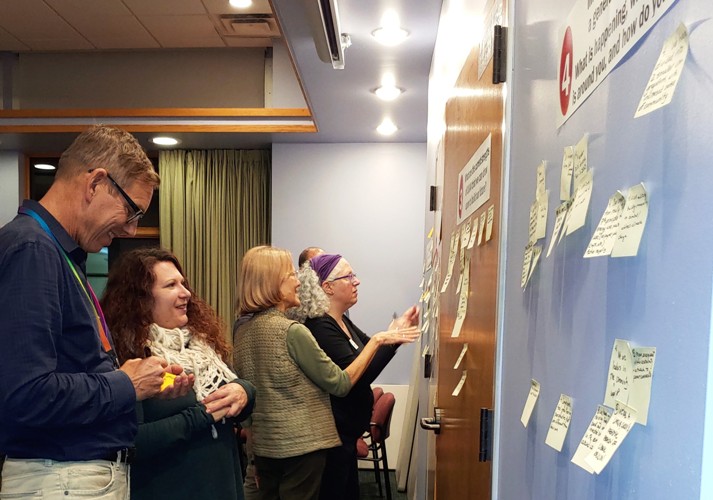
The Key Questions
Part I- Think of UUAA As It Is Today
- What happens at UUAA that makes you come alive, brings you joy, and gives you hope?
- When people ask you why you come to UUAA, what do you tell them you are proud of and value most?
- What are the current strengths of UUAA that we can draw upon to build our future?
Part II - Boldly Imagine UUAA In the FUTURE
- Imagine UUAA a generation from now – what is happening, what and who is around you, and how do you feel?
- Based on this imagined future what are we inspired to do inside our congregation?
- What role should UUAA play in the wider community – who/what should we be connected to?
Part III - Commitment and Challenges
- How would you like to contribute or become more involved in the life of our congregation?
- What are the BIG challenges facing our congregation that are getting in the way of our full potential?
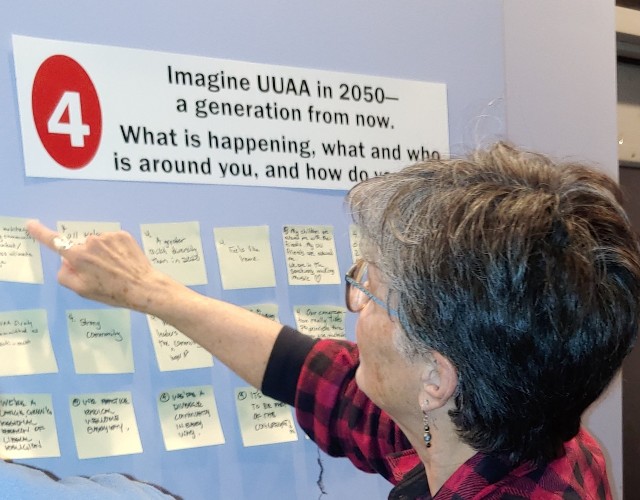
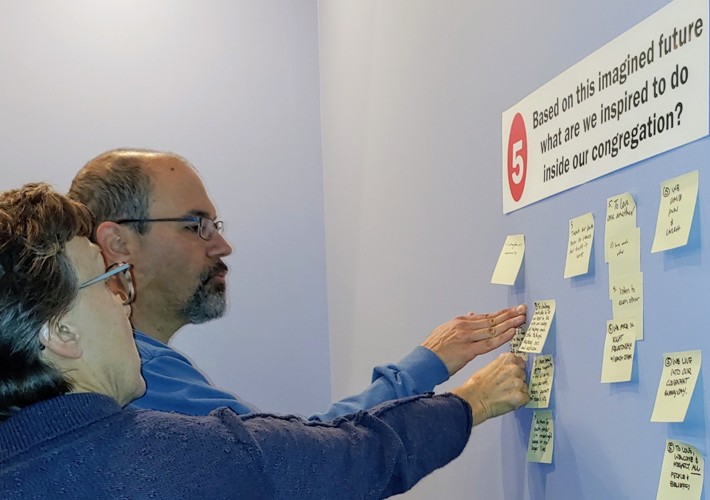
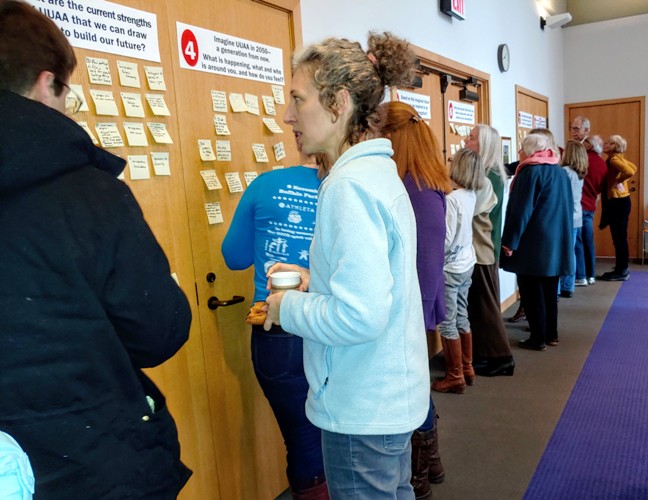
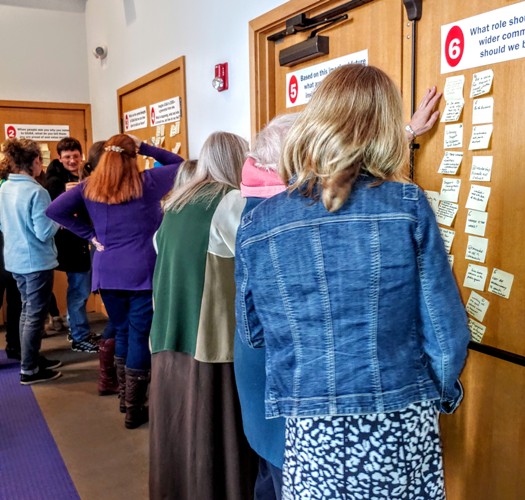
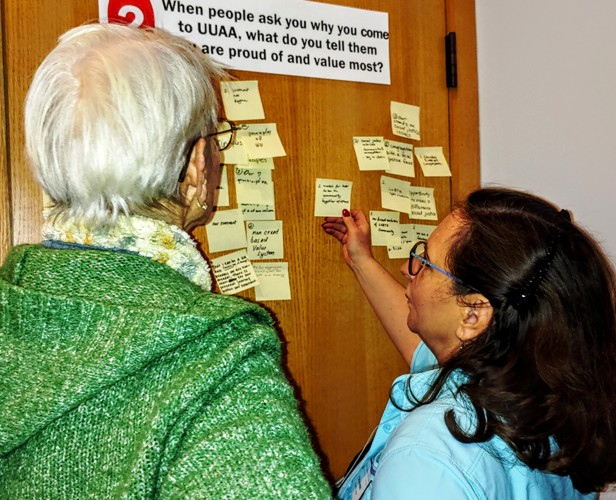
Vision 20/50 Project
During the 2019-20 year, UUAA engaged in deep and wide discussion about who we are as a congregation and how we want to travel together in the decades to come. The data we gathered affirmed our appreciation for community connections that run throughout our wonderful music programs, our inspiring Sunday Services, our vibrant youth programs and our wide-ranging commitments to social justice causes. We decided that to build on our past, tap into energy for current issues and address the issues that will most impact our future, we should focus our resources and energy on three overlapping issues:
- Climate Justice/ Environmentalism
- Anti-racism/ Anti-oppression
- Radical Welcome.
In June, 2020, the Vision 20/50 team submitted this report titled 'A Congregational Vision,' to the Board and the Congregation. This is a document the vision team wrote in your collected words to describe the Vision for UUAA.
Download or View: A Congregational Vision (May, 2020)
The Visioning Sessions in the fall of 2019 collected a huge amount of input from over 250 congregants. All of that input was distilled into a comprehensive document called the Theory of Change, which is the basis for the Vision document.
You can review that work: Theory of Change: Download the Theory of Change (TOC) PDF or View the TOC with added explanation
GA Workshop: At the 2020 UUA General Assembly our vision team, along with consultant Elandra Williams, presented a workshop on working together to build a vision, titled "Visioning and Governance Can Be Inclusive, Equitable, Co-owned".
Please follow this link to the video recording of the workshop.
The words the vision team collected were also used to draft a mission statement, vision statement and statement of purpose for UUAA. These statements will receive more congregational discussion during the next year. Download or view the draft Mission/ Vision/ Purpose Statements
Action Planning
We are now at work planning how to live into our vision! A Vision Steering Committee, led by Board members Rick Witten and Kathy Edgren lead the steering committee, which began work in fall, 2019. You can read the latest updates on our action planning work following this link.
Pictured below -- A Virtual Social Justice Roundtable discussed how our many social justice groups might align their work with the vision described in A Congregational Vision. Zoom session discussions allowed specific groups and all interested congregants to provide feedback on the draft Vision document. Revisions were then incorporated into the final document. Over 300 congregants contributed to this vision.
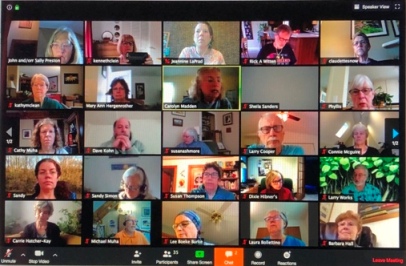
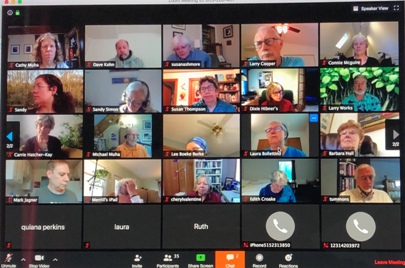
Review of the Visioning Process
During the 2019-20 year, we were all deeply involved in creating a vision of the future of UUAA, a guiding plan for how we can best use our resources to build a loving and resilient community and live our values in the wider world..UUAA's Vision 20/50 project has tried to hear all perspectives -- our youth, elders, teachers, social justice activists, music program enthusiasts, men's groups, women's groups... Everyone's views are important in guiding our journey together.
Process for Hearing from Everyone
In the Fall and Winter, 2019 we held Visioning Sessions that guided attendees through a set of questions about what we value and what we would like to see in the future of UUAA. Over 300 people took part in either a Visioning Session or an online survey of similar questions. From that large set of information, a document called the Theory of Change captured a distillation of our shared values, aspirations, things that make us unique, things that challenge us and more. The Theory of Change included a number of compelling issues congregants wanted to pursue. Congregants then ranked these issues. The Vision leadership then took all of the information and created the document, A Congregational Vision.
After the congregation ranked action areas of the Theory of Change, a clearer vision emerged, showing three priorities we are committed to engage with: Climate Justice, Anti-Racism/ Anti-Oppression and Radical Welcome.
To learn more about how this Vision evolved, please watch this video:
How were all of those Visioning Session sticky notes analyzed?
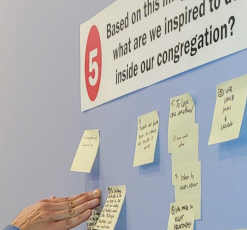
The Vision 20/50 Leadership Team, the Board of Trustees, the UUAA staff, an Analysis Team and of course, our consultant, were all involved in looking at the ideas that so many congregants, SGD youth and staff members contributed and creating the "UUAA Theory of Change"-- a big-picture vision for how UUAA can deepen our ties as a community and broaden our impact on the world. This was not a trivial job!
Interested in how the analysis happened?
Use this link to see an explanation of the analysis.
[The Vision 20/50 Analysis Team is led by Vision 20/50 co-chair Rick Witten and is made up of volunteers: Vanessa Campbell, Bobbi Coluni, Edie Croake, Constance Dickinson, Lorraine Gutierrez, Dixie Hibner, Beth Hospadaruk, Laura Johnstone, Jeannine LaPrad, Sam Lewis, Lissa Oliver and Sandy Simon.]
Why take time for visioning?
To find out why, take 49 seconds to watch this video.
In 2019 it felt like UUAA was at a threshold. Sound, values-driven planning has served us well in the past -- We have a beautiful, energy efficient, accessible building on 46 acres of rolling land. We have a creative and talented staff, a core of dedicated lay leaders and over 600 adult members with abundant energy and passion. Thanks to a strong search effort, shaped by our Core Values, we have an inspiring new Senior Minister. Let's build an awesome future on this solid foundation.
Our Consultant-- Elandria Williams
Consultant Elandria Williams will be guiding us through our visioning project. Elandria is currently co-moderator for the Unitarian Universalist Association (UUA). She visited our congregation in March to get to know more about us and facilitate the purpose/ visioning work design and returned in November to work on data analysis. A skilled facilitator and leader, Elandria works internationally and locally with communities in developing and living fully into vision and purpose.
Elandria came to Ann Arbor to get us started with a design workshop the week end of March 8th/9th. About 40 UUAA leaders took part in the 2-day high energy workshop. She is making regular visits in person and electronically throughout the year.
Read Elandria's Phase I/ Phase2 interim report on Vision 20/50 by clicking this link.
Elandria worked with Rev. Dr. Lisa Presley (MidAmerica Region) and Rev. Carlton Smith (Southern Region) to document the visioning process UUAA is piloting so that it can be used at other UU congregations. Our Vision 20/50 process was presented as a workshop at the 2020 General Assembly.
From the Vision 20/ 50 Co-Chairs
Thank you to hundreds of congregants for your deep involvement in this huge endeavor!
Rick Witten and Laura Bollettino, co-chairs of Vision 20/50
May 14th Faith in Our Future Dialogs

On May 14, 2011 a group of congregants gathered to provide input to the Faith In Our Future strategic planning efforts. Thank you to all of you who donated your Saturday morning to this effort! Some of the many ideas formulated by groups of the attendees are included below.
We should help people live their values: help them find connection, meaning, strength, first stepsin order to create a better world.
GOALS FOR UUAA PROGRAMS expressed by participants 5/14/11
Worship and Music
1. We have weekly (Wed or Sunday PM) creative, interactive, informal worship service at location served by P.T. that attracts students and young people from all regional campuses lead by paid staff person.
2. We have worship associates to assist the ministers in conducting services and to assist the minister in details of the service.
3. The services are promoted in terms of accessibility and inclusion, using latest technology in bringing things into the service.
4. We have representatives of social justice organizations use 2 minutes or present mission statements.
5. The worship services incorporate ongoing pastoral care work.
6. We have 6 choirs and 3 music ensembles.
7. We offer 3 Sunday services and a Wednesday evening service.
8. We have 5 outdoor services on our land under a shelter.
Spiritual Growth & Development
1. Strong, year-round Adult program, with ties to Children & Youth programs, Worship, Social Justice, and related programs
2. 600 Youth & Children and Half of all Adults – involved, participating and making SGD happen!
3. SGD offers a diverse bouquet of opportunities for spiritual practice which might include, for example, "Spiritual Practices: Mindful Living and Eating," such as might be recommended by the Locavores, or "Spiritual Practices: Appreciation of the Beauty of the Cosmos".
Social Justice
1. Our social justice programs are well integrated with national, international and statewide UU groups such as the UUSC (international) and MUUSJN (Michigan UU Social Justice Network). For example, we use only fair trade coffee from the UUSC program.
2. We have a paid Social Justice Coordinator (lay or minister) who works with all social justice programs for adults, youth or multi-generational to recruit and train leadership, coordinate efforts, help with publicity, etc.
3. We have great communication about our social justice programs both within our congregation and outside in the community. Everyone in the congregation knows about our programs and can easily sign up to help. Within the wider Ann Arbor community we are well known as a Social Justice Church.
Pastoral Care
1. By 2016 we have a visible, grass roots, Pastoral Care program that is embedded in our culture.
2. By 2016 we have a comprehensive, communication system that informs the congregation of individual needs, status updates, pastoral care program structure and process.
3. By 2016 we have model Pastoral Care programs and services for:
- - Elders
- - Youth
- - Families
- - Special needs
- - Single parents
- - Singles
Chalice Circles
1. Chalice Circles programs exist for youth and seniors throughout the Heartland District.
2. UUAA Chalice Circle program serves as a regional training /mentoring hub.
3. Chalice Circle leadership regularly attends small group ministry meetings. The lay leadership is fully supported and trained.
Recreation / Social
1. There are UUAA hospitality leaders, whose mission it is to connect people to groups, will be clearinghouse and network savvy.
2. Interweave: Interweave, which supports structures for leadership development, provides leadership within FUUAA, Ann Arbor, Michigan and national level.
3. Women and men’s programming: They have adequate staff support these programs which involves leadership development.
A collection of "functional" goals (not specific to a program)
• More potlucks and informal gatherings [face-to-face time, in addition to, not replaced by, technology]
• Include the congregation activities and structure in our directory
• Accessibility – Large print, physical access, “T” system for hearing impaired, etc
• Communication between groups to know each other’s activities
• Clear lines of authority & coordination – published for reference (in directory)
Governance, Decisions, Planning
• More staff – both paid and volunteer
• Paid appropriately
• Supporting existing staff (secretarial, other resources)
Staffing& Office Resources
• We have adequate staff who empower the congregation
• Appropriate compensation to staff (salaries & benefits)
• Add a Social Justice Minister
• Webmaster as paid position
• Professional staff not overworked on jobs not within their training
• Projector and appropriate and updated technology (social networking, other new electronic / tech ideas we can’t foresee)
Land / Facilities
• Buy surrounding land – 100 acres
• Wheelchair accessibility
• Soccer field
• Remove Buckthorn – 10% addition to (useable) land
• Use bounty of our land to share with others (Good Food Garden)
• Increase accessibility and useful space for programs (shelter, shade)
Financing / Stewardship
• Increase financial participation by everyone [make value visible / obvious]
• Mortgage paid off, leading to increased investment in other areas and strong financial base
Welcoming, Integrating New Members
• Recruit more families into the congregation
• Spread “welcoming practices” into the congregation e.g. Interweave
• Help people find a niche in the congregation
• Growth is a big part of our vision
• Interfaith youth activities
Faith in Our Future
"Don't ask yourself what the world needs. Ask yourself what makes you come alive, and then go do it. Because what the world needs is people who have come alive." --Howard Thurman
Faith in Our Future -
Strategic Planning
All of our programs and processes are framed by our Core Values.
From April through December of 2011 our congregation engaged in a democratic process of creating a Strategic Plan for our next five years. The Strategic Plan was submitted to the Board of Trustees in December. As part of the planning process, every program in our congregation developed 5 year goals that will be updated every year.
This congregation has a proud heritage of making real that which we dream to achieve. We've done bold things before and we will do bold things again! Henry David Thoreau said, "You've built your castles in the sky. Now, put your foundations under them." Dreams first. Then funding and structure. We get dreams done at First UU Ann Arbor.
Wondering what sorts of ideas were suggested? Everything from "pay the mortgage" to buy a passenger van to raise goats on our land to Chalice Circles in nursing homes have been added to the mix.
You may want to read the "Flashes to Our Future" that came out of our April 27th interviews with program leaders.
On Saturday MAY 14th a group of congregants took part in a Faith in Our Future planning event. Read about what that group had to say about our future.
You may want to brush up on the Core Values that Guide our Governance. These core values are the foundation for the strategic plans we are developing.
The final Faith in Our Future comprehensive strategic plan was submitted to the Board of Trustees - updated in May of 2012.
The board then derived a 2011-2016 plan scaled to the congregation's means, entitled Strengthening Our Connections.
The Strategic Planning Task Force
Co-Chairs of the task force: Terry Madden and Bruce Gibb. .Other members of the task force were: Jim Breck, Bob Dinan, Kathy Friedrichs, Bob Hospadaruk, Paul Morris, Margaret Pekarek, Leigh Robertson and Sandy Simon. Board liaisons: Tom Reischl and Joan Burleigh.
Core Values
Our Core Values guide our interactions and our governance. In 2009-10 our congregation engaged in an appreciative inquiry project that resulted in adoption of these Core Values.
First Unitarian Universalist Congregation of Ann Arbor
Our Core Values
The First Unitarian Universalist Congregation of Ann Arbor, MI has been deeply committed to liberal religious thought and action since 1865. We join together in community to encourage and inspire each other’s spiritual journeys, to honor and care for the natural world around us, and to join forces in furthering social justice in the Ann Arbor area and the wider world.
Spiritual life
We find inspiration, renewal, and challenge in worship services. Children, youth and adults are enriched by classes and programs that expand religious understanding and nurture spiritual growth rooted in Unitarian Universalist traditions and values.
Social Justice and Environmental Action
We live our beliefs by creating, sustaining, and enhancing programs that actively engage congregants of all ages in projects that promote peace, justice, and positive environmental action locally and beyond.
Community
We create and foster community by providing an intentionally welcoming and safe environment where all feel valued and cared for, and where all are given opportunity to form meaningful connections with one another. We foster a climate of purposeful inclusion of all. We cherish the diversity of gender, age, race, ethnicity, national origin, range of abilities, sexual orientation, gender identity, financial means, education, and political perspective. We live together in peace, search for truth in love, and help one another.
Stewardship
We are all active stewards, serving our congregation and pursuing our ministries through prudent and creative use of our resources, whether physical, environmental, financial or human. We show respect and care for our beautiful building and grounds, for our staff, and for one another. We cultivate right relationships among Members of this congregation and with the wider world.
Culture
We are nourished by the culture that has evolved in this congregation throughout our rich liberal religious heritage in Ann Arbor, a culture rooted in our core belief in the inherent worth and dignity of every individual. We learn and grow from our differences. We value our connections, past, present and future, to the Unitarian Universalist world.
Follow this link to learn about our UUAA Vision.

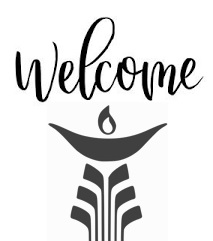 NEW TO UUAA?
NEW TO UUAA?